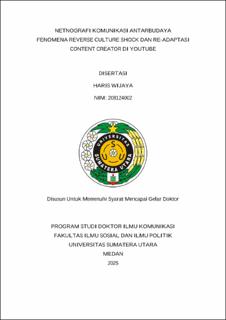Netnografi Komunikasi Antarbudaya Fenomena Reverse Culture Shock dan Re-Adaptasi Content Creator di Youtube
Netnographic of Intercultural Communication of Reverse Culture Shock and Re-Adaptation Phenomenon Among Content Creators on Youtube

Date
2025Author
Wijaya, Haris
Advisor(s)
Lubis, Lusiana Andriani
Zulkarnain, Iskandar
Nurbani
Metadata
Show full item recordAbstract
This research aims to analyze the digital footprints left by Youtube content creator regarding reverse culture shock and their re-adaptation efforts to reintegrate into their social environment of their home region after an extended period abroad. This research uses theories and concepts related to intercultural communication, reverse culture shock theory, re-adaptation theory, new media, and content creator. The netnography method is applied to explore this issue using Robert V Kozinets’ six stage netnographic procedures: initiation, interaction, investigation, immersion, integration, and incarnation. Data mining is conducted using lurking and crawling techniques, supported by NodeXL Pro for Social Network Analysis. 18 Youtube channels are studied, namely Nihongo Mantappu, Rosakis, Korea Reomit, Hari Jisun, Diera Nathania, Felipe Valdes, Naila Farhana, Puri Viera, Yusuke (wasedaboys), Orvala, Priscilla Lee, Mathias Pettersen, Bung Korea, Nona Ceko, Bule Maia Lan, Ivy Phan, Koala TV, and Kaisara Kee. The results of the 34 month research indicate that they experienced various reverse culture shocks, namely: tradition of cebok (water cleansing after using the toilet), Bali belly, Indonesia’s rich culinary spices, palli-palli culture and strong work ethic, the use of the right hand and left hand, the warmth and friendliness of the people of Indonesia, road traffic conditions, and the Indonesian language as lingua franca. Regarding the re-adaptation process, it is found that not everyone is able to successfully reintegrate into their home regions. Those who fail to re-adapt to their home region eventually face the following choices: continuously experiencing discomfort in their hometown, returning to their second home (host country) abroad, or opting to change their citizenship to that of the host country.YouTube emerges as both a coping platform and a space for mutual learning through content creator and audience engagement. The study introduces the Cultural Similarity and Differentiation Management framework, which explains how individuals negotiate cultural identity during re-entry by identifying similarities and differences in their lived experiences. These findings offer theoretical and practical insights for understanding digital-era identity transitions and inform the development of support systems for returnees in increasingly mobile societies.
